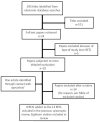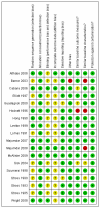Local opinion leaders: effects on professional practice and health care outcomes
- PMID: 21833939
- PMCID: PMC4172331
- DOI: 10.1002/14651858.CD000125.pub4
Local opinion leaders: effects on professional practice and health care outcomes
Update in
-
Local opinion leaders: effects on professional practice and healthcare outcomes.Cochrane Database Syst Rev. 2019 Jun 24;6(6):CD000125. doi: 10.1002/14651858.CD000125.pub5. Cochrane Database Syst Rev. 2019. PMID: 31232458 Free PMC article.
Abstract
Background: Clinical practice is not always evidence-based and, therefore, may not optimise patient outcomes. Opinion leaders disseminating and implementing 'best evidence' is one method that holds promise as a strategy to bridge evidence-practice gaps.
Objectives: To assess the effectiveness of the use of local opinion leaders in improving professional practice and patient outcomes.
Search strategy: We searched Cochrane EPOC Group Trials Register, the Cochrane Central Register of Controlled Trials, MEDLINE, EMBASE, HMIC, Science Citation Index, Social Science Citation Index, ISI Conference Proceedings and World Cat Dissertations up to 5 May 2009. In addition, we searched reference lists of included articles.
Selection criteria: Studies eligible for inclusion were randomised controlled trials investigating the effectiveness of using opinion leaders to disseminate evidence-based practice and reporting objective measures of professional performance and/or health outcomes.
Data collection and analysis: Two review authors independently extracted data from each study and assessed its risk of bias. For each trial, we calculated the median risk difference (RD) for compliance with desired practice, adjusting for baseline where data were available. We reported the median adjusted RD for each of the main comparisons.
Main results: We included 18 studies involving more than 296 hospitals and 318 PCPs. Fifteen studies (18 comparisons) contributed to the calculations of the median adjusted RD for the main comparisons. The effects of interventions varied across the 63 outcomes from 15% decrease in compliance to 72% increase in compliance with desired practice. The median adjusted RD for the main comparisons were: i) Opinion leaders compared to no intervention, +0.09; ii) Opinion leaders alone compared to a single intervention, +0.14; iii) Opinion leaders with one or more additional intervention(s) compared to the one or more additional intervention(s), +0.10; iv) Opinion leaders as part of multiple interventions compared to no intervention, +0.10. Overall, across all 18 studies the median adjusted RD was +0.12 representing a 12% absolute increase in compliance in the intervention group.
Authors' conclusions: Opinion leaders alone or in combination with other interventions may successfully promote evidence-based practice, but effectiveness varies both within and between studies. These results are based on heterogeneous studies differing in terms of type of intervention, setting, and outcomes measured. In most of the studies the role of the opinion leader was not clearly described, and it is therefore not possible to say what the best way is to optimise the effectiveness of opinion leaders.
Figures
Update of
-
Local opinion leaders: effects on professional practice and health care outcomes.Cochrane Database Syst Rev. 2007 Jan 24;(1):CD000125. doi: 10.1002/14651858.CD000125.pub3. Cochrane Database Syst Rev. 2007. Update in: Cochrane Database Syst Rev. 2011 Aug 10;(8):CD000125. doi: 10.1002/14651858.CD000125.pub4. PMID: 17253445 Updated.
References
References to studies included in this review
-
- Althabe F, Buekens P, Bergel E, Belizán JM, Campbell KM, Moss N, Hartwell T, Wright LL. A Behavioural Intervention to Improve Obstetrical Care. N Engl J Med. 2008;358:1929–40. - PubMed
-
- Berner ES, Baker CS, Funkhouser E, Heudebert GR, Allison JJ, Fargason CA, et al. Do local opinion leaders augment hospital quality improvement efforts? A randomized trial to promote adherence to unstable angina guidelines. Medical Care. 2003;41(3):420–31. - PubMed
-
- Cabana KK, Evans SD, Mellins RB, Brown RW, Lin X, Kacirotiand N, Clark NM. Impact of Physician Asthma Care Education on Patient Outcomes. Pediatrics. 2006;117:2149–2157. - PubMed
-
- Elliott TE, Murray DM, Oken MM, Johnson KM, Braun BL, Elliott BA, et al. Improving cancer pain management in communities:main results from a randomized controlled trial. Journal of Pain & Symptom Management. 1997;13:191–203. - PubMed
-
- Guadagnoli E, Soumerai SB, Gurwitz JH, Borbas C, Shapiro CL, Weeks JC, et al. Improving discussion of surgical treatment options for patients with breast cancer: local medical opinion leaders versus audit and performance feedback. Breast Cancer Research and Treatment. 2000;61(2):171–5. - PubMed
References to studies excluded from this review
-
- Bloomfield HE, Nelson DB, van Ryn M, Neil BJ, Koels NJ, Basile JN, Samaha FF, Kaul R, Mehta JL, Bouland D. A trial of education, prompts, and opinion leaders to improve prescription of lipid modifying therapy by primary care physicians for patients with ischaemic heart disease. Qual Saf Healt Care. 2005;14:258–263. - PMC - PubMed
-
- Closs SJ, Briggs M, Everitt VE. Implementation of research findings to reduce postoperative pain at night. International Journal of Nursing Studies. 1999;36(1):21–31. - PubMed
-
- Denton GD, Smith J, Faust J, Holmboe E. Comparing the efficacy of staff versus housestaff instruction in an intervention to improve hypertension management. Academic Medicine. 2001;76(12):1257–60. - PubMed
-
- Dijkstra RF, Niessen W, Braspenning JCC, Adang E, Grol RTMP. Patient-centred and professional-directed implementation strategies for diabetes guidelines: a cluster-randomised trial-based cost-effectiveness analysis. Diabetic Medicine. 2005;23:164–170. - PubMed
-
- Doyne EO, Alfaro MP, Siegel RM, Atherton HD, Schoettker PJ, Bernier J, et al. A randomized controlled trial to change antibiotic prescribing patterns in a community. Archives of Pediatrics and Adolescent Medicine. 2004;158(6):577–83. - PubMed
Additional references
-
- Coleman J, Katz E, Menzel H. Medical innovation: a diffusion study. Bobbs-Merrill; Indianapolis (IN): 1966.
-
- Doumit G, Grimshaw J, Graham I, Smith A, Wright F. Master Thesis. University of Ottawa; Ottawa, Canada: 2006. Opinion leaders - Effectiveness, Identification, Stability, Specificity, and Mechanism of Action.
-
- Effective Practice and Organisation of Care Group [accessed 14 Jan 2010];EPOC Risk of Bias criteria. http://www.epoc.cochrane.org
References to other published versions of this review
-
- Doumit G, Gattellari M, Grimshaw J, O’Brien NMA. Local opinion leaders: effects on professional practice and heath care outcomes. Cochrane Database of Systematic Reviews. 2007;(1) DOI: 10.1002/14651858.MR000006.pub3.
-
- Thomson O’Brien MA, Oxman AD, Haynes RB, Davis DA, Freemantle N, Harvey EL. Local opinion leaders: effects on professional practice and health care outcomes. Cochrane Database of Systematic Reviews. 1999;(2) DOI: 10.1002/14651858.CD000125. - PubMed
Publication types
MeSH terms
Grants and funding
LinkOut - more resources
Full Text Sources
Medical
Miscellaneous




